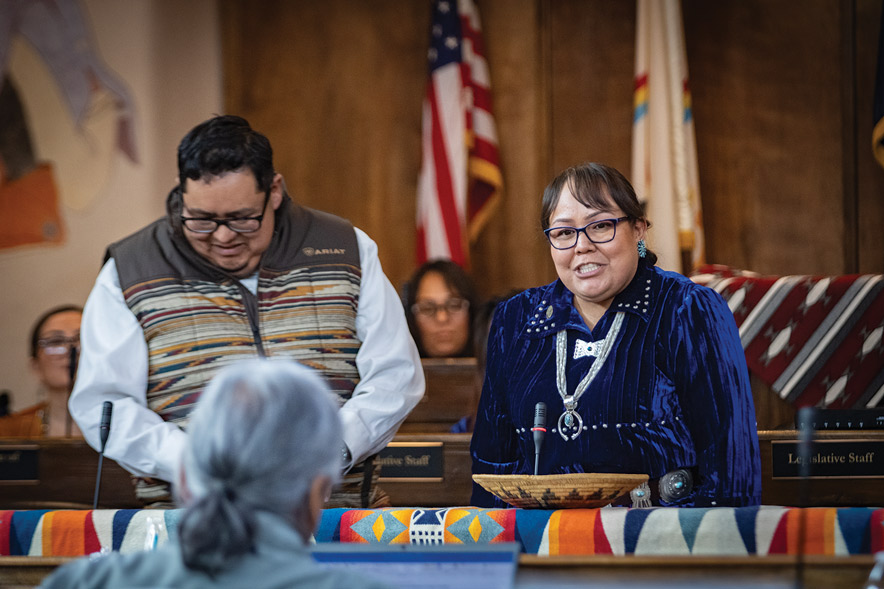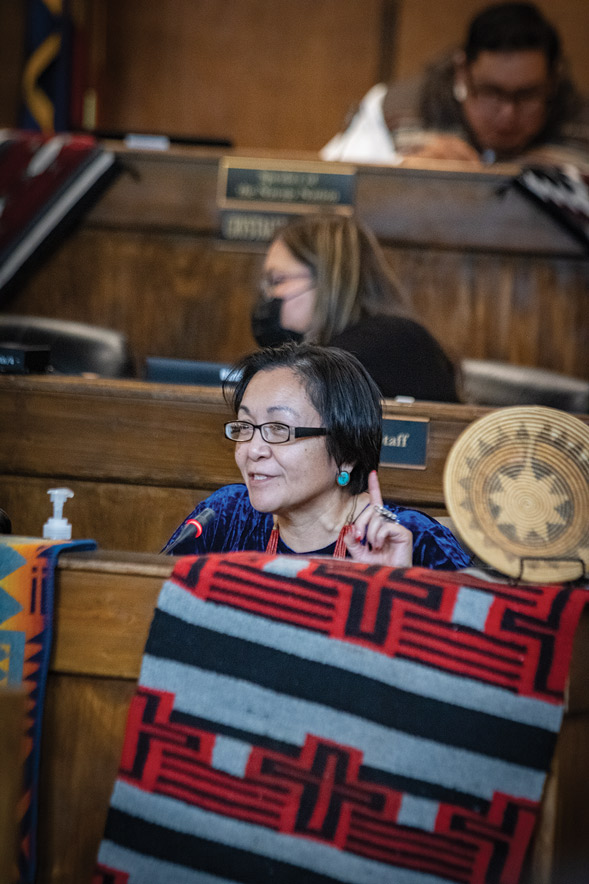
Council gears up for busy Winter Session, addressing infrastructure, environment, and governance

Special to the Times | Reginald Chee
Speaker Crystalyne Curley stands alongside Delegate Seth Damon inside the Navajo Nation Council Chamber during the first day of the Winter Session in Window Rock. Damon announced his resignation from the Council to take a position as New Mexico's deputy secretary of Indian Affairs. Curley acknowledged Damon for his service to the Navajo Nation and the Diné.
WINDOW ROCK
The 25th Navajo Nation Council started its Winter Session on Jan. 22 with a packed agenda tackling critical issues ranging from infrastructure funding to environmental cleanup and potential changes to chapter meeting attendance.
Over five days, Council delegates will delve into reports, proposed legislation, and old business, shaping the Nation’s course in the months ahead.

Special to the Times | Reginald Chee
Navajo Nation President Buu Nygren makes his way around the room at the Nahat’á Bá Hooghan Monday morning, during the first day of the Winter Session in Window Rock.
Leading the agenda is a batch of 13 new bills seeking funding for crucial projects across the Navajo Nation. From extending water lines to Kin Dah Łichí’í homes to constructing a new education building at Utah State University’s Monument Valley campus and providing essential transportation services in Tohatchi, New Mexico. Many of the proposals aim to address long-standing infrastructure needs and improve the quality of life for Navajo citizens.
The session will also feature reports from key leadership figures, including President Buu Nygren’s “The People’s State of the Nation Address” and updates from the chief justice, speaker, and controller. Additionally, representatives from the Bureau of Indian Affairs, Indian Health Service, the attorney general’s office, and the Navajo Nation Youth Advisory Council will offer insights and updates on their focus areas.
Old business
One crucial piece of old business occupying the Council’s attention is Legislation 0130-23, sponsored by Delegate Andy Nez. This legislation seeks to appropriate $5 million from the Sihásin Fund to the Navajo EPA for assessing and remediating environmental damage caused by historical lumber processing activities in the Red Lake and Sawmill chapters. Its passage requires a two-thirds majority vote.
The Council will also consider Legislation 0255-23, sponsored by Delegate Vince R. James, which seeks to override the president’s veto of a previous resolution allowing virtual attendance at chapter meetings. This measure can significantly impact community engagement and access to governance processes within the Navajo Nation.
There is also a pair of emergency legislation sponsored by Danny Simpson. Legislation 0016-24 and 0017-24 will authorize a special election to replace Delegate Seth Damon, who resigned last week to serve as New Mexico Deputy Secretary of Indian Affairs, according to Speaker Crystalyne Curley.
Presentations, announcements
Throughout the five-day session, delegates will also hear guest presentations and make official announcements, setting the stage for continued action and progress in the months ahead. Stay tuned for further updates as the Navajo Nation Council navigates this significant Winter Session.

Special to the Times | Reginald Chee
Vice President Richelle Montoya greets officials and visitors at the Nahat’á Bá Hooghan Monday morning, during the first day of the Winter Session in Window Rock.
Here are the other proposed legislations the Council will be considering this week:
- Legislation 0155-23, sponsored by Delegate Steven Arviso, proposes allocating $296,211 from the Sihásin Fund to purchase a new motor grader for the Pinedale Chapter.
- Sponsored by Delegate Brenda Jesus and co-sponsored by Damon, Legislation 0246-23 seeks to extend the Rainfall Index Pasture, Rangeland, and Forage Pilot Insurance Program. This program uses Sihásin Funds to guarantee the Navajo Nation’s annual premiums for a USDA-administered weather insurance program for ranchers. The proposed amendment would extend the program’s coverage through crop year 2028.
- Delegate Herman M. Daniels Jr. proposes Legislation 0250-23, co-sponsored by Damon, to allocate $500,000 from the Sihásin Fund to construct a new education building at USU’s Monument Valley campus. The legislation aims to support educational opportunities in the region.
- James and Simpson are co-sponsoring Legislation 0009-24, seeking to allocate $17,628 from the Sihásin Fund to the Navajo Tribal Utility Authority for extending a gas service line to Gladys Jones’ residence in Ganado, Arizona.
- Legislation 0014-24, sponsored by delegates Shaandiin Parrish, Curley, and Damon, proposes adding new expense categories for using U.S. Treasury Fiscal Recovery Funds. It also seeks to skip Council approval for amendments to the bathroom addition funding plan within the Fiscal Recovery Fund, allowing for administrative approval of these additions. This legislation amends previous legislation that paid for bathroom additions to enable funds to be spent on septic systems, cisterns, sewage lagoons, and other wastewater treatment for rural communities that do not have water and wastewater infrastructure in place, according to Parrish.
- Legislation 0008-24, championed by James and Simpson, aims to allocate $1.4 million from the Sihásin Fund to the NTUA. This funding would enable the construction of roughly two miles of waterline extensions in the Kin Dah Łichí’í, providing much-needed access to clean water for 16 families.
- Legislation 0003-24, sponsored by Delegate Andy Nez, focuses on extending the deadline for utilizing Sihásin Funds allocated to the Navajo, New Mexico apartment/multi-purpose complex project. This amendment to existing legislation, CJY-35-22, essentially aims to buy more time to complete the project with Sihásin funding before it is returned to the general fund.
- Legislation 0259-23, presented by Parrish, seeks to confirm the president’s appointment of certified public accountant Sean McCabe as the new controller of the Navajo Nation. This crucial position oversees the Nation’s financial operations.
- Legislation 0265-23, sponsored by Damon and co-sponsored by Norman M. Begay, Amber Crotty, James, and Nez, proposes a one-time payout of excess annual leave to all Navajo Nation executive and legislative branch employees. This involves temporarily waiving a section of the “personnel policies manual” and allocating $3.5 million from the Unreserved, Undesignated Fund Balance to the controller’s office for disbursement. While offering a potential financial benefit to employees, the legislation raises concerns about its budgetary impact and precedent-setting implications.
- Legislation 0002-24, championed by James, aims to allocate $446,595 from the Navajo Nation’s UUFB to the Tohatchi Area of Opportunity and Services Inc. This funding would enable the non-profit to purchase 11 new vehicles, significantly enhancing their ability to provide vital transportation services to their clients.







 Highway 264,
Highway 264, I-40, WB @ Winslow
I-40, WB @ Winslow